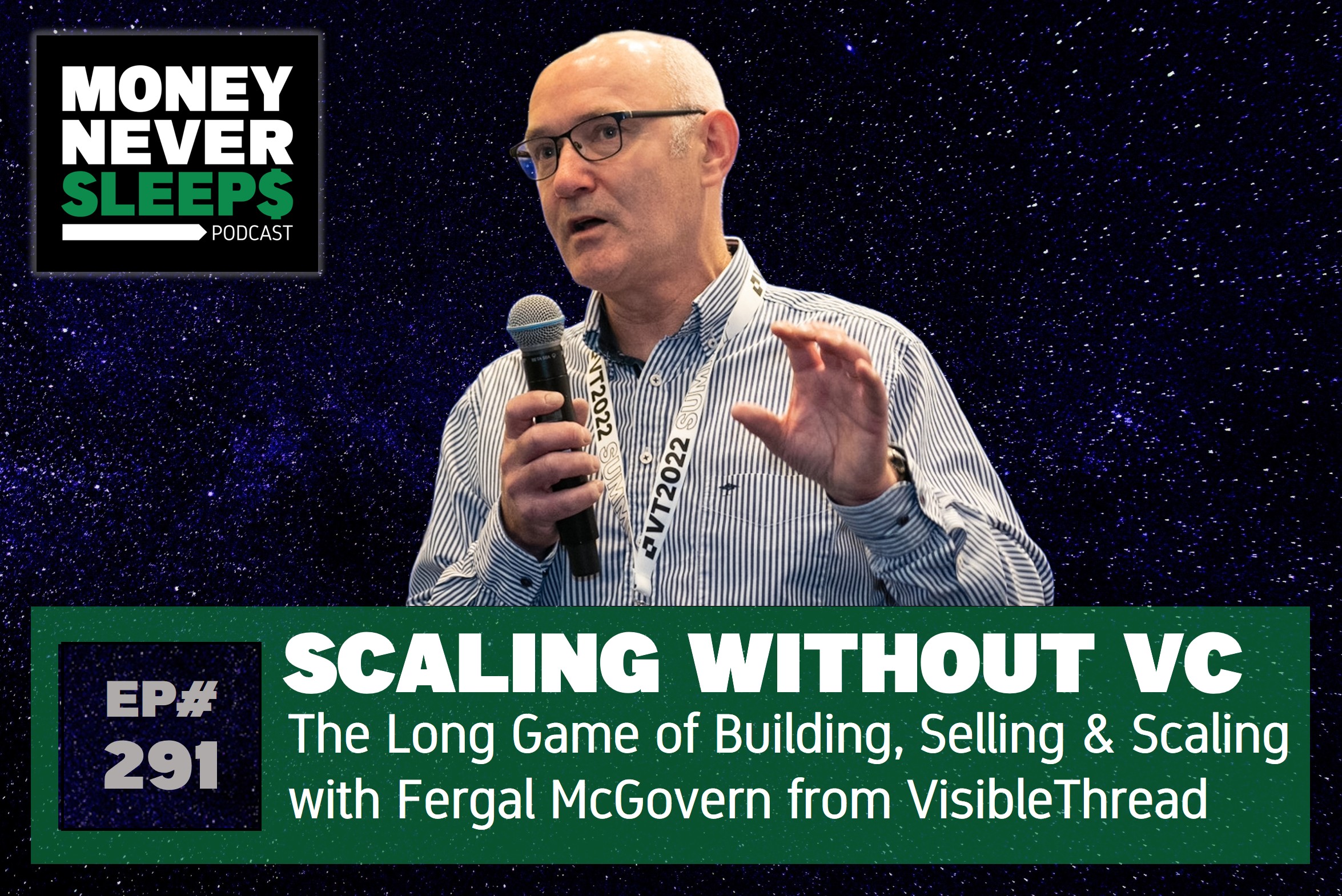091: Money Talks #17: Speeding up the Enterprise Sales Cycle with David Vatchev from R3

This week we talk to David Vatchev, Venture Development Lead at R3, on what it takes to survive uncertainty, stay relevant to investors while the venture capital cycle slows down, and also understand, measure and speed up the enterprise sales cycle...a bi
This episode is kindly sponsored by Ireland’s fintech and financial services recruitment specialists, Top Tier Recruitment. If you would like an intro to the team at Top Tier Recruitment, please click here. Also, watch for the first edition of the MoneyNeverSleeps newsletter that we're sending out before the end of this month!
This week we talk to David Vatchev from R3 about his role as Venture Development Lead and we did a deep dive into how startups can come to grip with the enterprise sales cycle, which is so relevant right now with how much harder enterprise sales have become with the pandemic, especially for startups embracing newer technologies. R3 is “an enterprise blockchain software firm working with a broad ecosystem of more than 300 participants across multiple industries from both the private and public sectors to develop blockchain applications on Corda, an open-source blockchain platform, and Corda Enterprise, a commercial version of Corda for enterprise usage.” At R3, David helps “CorDapps” or startups leveraging Corda at the core of their business, to build, grow and scale. Before joining R3, David spent 15 years in the capital markets, so he has first-hand experience with that industry's inefficiencies, which is one of the big problems R3 set out to solve.
Given David's role with R3 and Pete Townsend's approach with helping distributed ledger technology (DLT) enabled startups find their first customers, get funded, and get their products to market, this conversation was just waiting to happen.
Here are some of the highlights of their conversation:
- On the big ask of DLT-enabled startups: "DLT is a technology, but how can you use it to solve real world problems?"
- On VC funding: "The unprecedented uncertainty of 2020 has really turned startup fundraising completely on its head, so many of these early stage startups are left wondering, how can they continue to grow their business when access to capital is seemingly frozen?"
- Summary of key points from VCs (although easier said than done!) - "Reduce costs, offer new revenue streams, find out what customers need right now and what they will be needing in the short term. Find your product market fit very quickly and prove that your solution is absolutely necessary. Cashflow is king, find ways to bring it in now. Valuations are being re-set so optimize for runway not valuations. Stay with it, keep persevering, as VCs are moving more slowly bu they're still there, so stay relevant and stay focused."
- On actionable tips for startups: "Use this as an opportunity to make sure your investor deck is up to scratch, that you’re not showcasing a technology or proposing your business to a customer. Make sure you’re explaining your business in a concise, compelling and actionable format for an investor to grab their attention. What metrics are they looking at, what do they care about? Is it my technology, or how I execute the plan?"
- On macro trends: "Beyond digital transformation, I’m optimistic that VC funding will start to accelerate again as the investors behind VCs view the public markets as more and more expensive, and investors look to alternatives."
- On the enterprise sales cycle: "If you’re not measuring and tracking what you’re doing, you won't be able to improve, and then subsequently shorten the sales cycle."
- On a structured approach to B2B sales: "You can’t just rely on customer introductions - you have to go beyond that and create definable, repeatable, scalable strategy that you can leverage for the future."
- On the length of the enterprise sales cycle: "Why the B2B enterprise sales process is so long is that they have a set of jobs they need to do within the process, and you need to map out the customer journey. They need to find decision-enabling information to allow them to make a purchase, they need to validate how it’s relevant to them, drive alignment of internal stakeholders, and there’s an average of 7 internal stakeholders in any enterprise decision."
- On the deep-dive into the buyer persona: "Who are the buyers, what are their problems, what obstacles do they have, what’s their timing, what are their personality traits, what’s their day-to-day life, what’s their influence, what are their motivations? Do the other stakeholders see this as much of an urgent problem as your main contact does?"
- On the human approach: "When people throw the tagline B2B out there, people forget that there’s a still a human at the other end of that transaction, and relating to them at the personal level is important, and that doesn't change just because it’s a B2B model.”
- On the UX and CX of the B2B process: "The same people that are preconditioned to expect a great user experience from apps on their smartphone are also B2B buyers - you need to replicate that as much as you can with the B2B sales process."
Helpful resources shared by David produced by R3:
- A Startup’s Guide to Speeding Up the Enterprise Sales Cycle
- Enterprise Startups: Actionable Fundraising Tips From R3’s Investor Community
- R3's Venture Development Program - A Gateway Into Our Ecosystem
To listen to more, please visit https://www.moneyneversleeps.ie/ for all of our other episodes. Also, follow us on Twitter @MNSShow, @PeteTownsendNV and @EoinFitzgerald9 for updates and more information.
Finally, If you'd like an intro to Pete Townsend, please click here. If you'd like an intro to Eoin Fitzgerald, please click here.






























